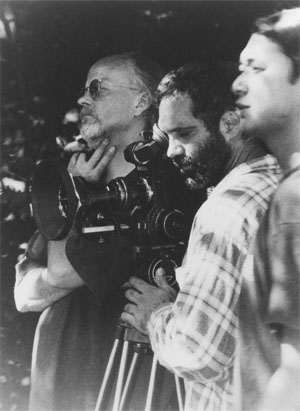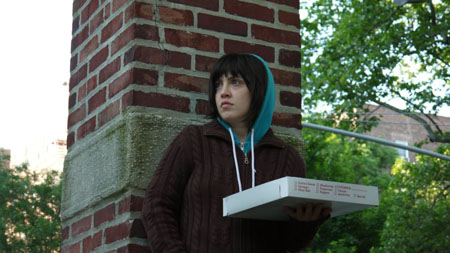I had the long overdue pleasure of meeting Dan Sallitt when he brought his fourth feature, The Unspeakable Act, to Berlin. I’m glad to see that, as noted below, Joseph Jon Lanthier addresses the language spoken by the family at the center of this remarkable film, as it strikes me as both utterly natural and yet absolutely unique to current American independent cinema. As for the cinematic language, as Dan revealed in Craig Keller‘s must-read June 2012 conversation with him for the Notebook, he’s culled his impressive vocabulary and grammar from the greats.
Let’s begin with Scott Foundas in the Voice: “It’s difficult to pinpoint exactly why the films of Dan Sallitt have remained such a well-kept secret for the past two decades, poorly distributed and rarely revived, despite a small but enthusiastic following of critics, programmers, and the French director Arnaud Desplechin, who has likened Sallitt to Ingmar Bergman. But it surely has something to do with the fact that Sallitt is an American working in a European idiom, and that he seems oblivious to the prevailing fashions of American indie cinema (from Tarantino to mumblecore) and incapable—on-screen and off—of calling attention to himself. So kudos to Anthology Film Archives for calling that attention for him with an overdue retrospective of Sallitt’s small but singular body of work, beginning with a week-long run of his latest feature, The Unspeakable Act.”
“Jackie, the young, independent-minded woman who drives this character study, doesn’t have a problem articulating herself,” writes Nicolas Rapold in the New York Times. “She is stepping into a high school summer that’s more critical for being right before her brother Matthew leaves for college (always a perilous time, to judge from this and David O. Russell’s Spanking the Monkey). The Unspeakable Act follows Jackie (the arrestingly wide-eyed Tallie Medel) through her long-held incestuous fixation with Matthew (Sky Hirschkron). These feelings are much considered in voice-over; broached with the studious Matthew himself; and revealed to a therapist, whose presence dovetails with this literate film’s seriousness about self-expression and finding oneself.”
Time Out New York‘s David Fear focuses on the performances. Overall, he’s less impressed with them than I am, but, honing in on Tallie Medel, he’s right on target: “[T]his young performer knows exactly how to express Jackie’s confusion, vulnerability, instability and longing without any sense of judgment; the film would simply not work without her, no matter how sensitively Sallitt handles such provocative, ick-producing bait.”
“Sallitt’s All the Ships at Sea from 2002 was similarly concerned with off-kilter familial dynamics,” notes Joseph Jon Lanthier in Slant. “Depicting a series of increasingly contentious conversations between two aging sisters, both of whom had drifted from the agnosticism of their upbringing into rigidly organized religions, the movie eloquently tests the limits of sororal intimacy and self-knowledge with faith-based debate. By comparison, the brother and sister of The Unspeakable Act are far more transparently insecure and almost implausibly genuine; the bulk of the story concerns Jackie’s suspiciously un-ironic adjustment into a routine of clumsy sex and psychotherapy after her beloved Matthew matriculates at Princeton, making himself unavailable for such curiously familiar tokens of sisterly attention as haircuts and half-naked bathroom encounters. Among the significant attributes that this film and its predecessor share, however, is a textual (nearly novelistic) attitude toward dialogue; the hyper-analytical, honest-to-a-fault first-person voice and traumatically entwined twin sisters of Dorothy Baker’s Cassandra at the Wedding are particularly tempting literary analogues.”
Indiewire‘s Eric Kohn has capsule reviews of all four features. Here he is, for example, on Polly Perverse Strikes Again! (1986): “Despite his own misgivings about it, Sallitt’s grimy first feature (shot on lo-fi video) is a surprisingly watchable dark comedy about philandering drunkard Theresa (Dawn Wildsmith), who surfaces in Los Angeles and makes a desperate attempt to win back established photographer Nick (S.A. Griffin), despite his settled life with a supportive girlfriend.” And Honeymoon (1998): “Sallitt’s capacity to draw a contrast between the convictions of lonely dreamers and the harsh truths that hold them back truly come out in this deeply involving tale of a romance gone sour.”
New interviews: Brandon Harris (Filmmaker) and Peter Labuza (The Cinephiliacs).
Photo via Anthology Film Archives. The Films of Dan Sallitt runs through March 8, while The Unspeakable Act is on through March 7.
Update, 3/4: “I remember thinking as I watched Dan Sallitt’s The Unspeakable Act at the 2012 BAMcinemaFest that it’s an American version of an Éric Rohmer film,” recalls Amy Taubin, writing for Artforum. “The comparison was validated by the final credit, a thank you to the French master of movies as conversations on morality and ethics, where light—from the sun, the moon, or a carefully placed lamp—often has the last word. Nine months later, a more immediate comparison comes to mind: The film is an antidote to Lena Dunham’s Girls.”
Update, 3/6: “Sallitt was already a Brooklyn-based-and-proud independent filmmaker back when Park Slope rents were cheap and no one gave a hoot about the lives of Greenpoint’s girls,” notes Jonathan Robbins, writing for Film Comment. “Sallitt’s is a pared-down, lean cinema that walks a tightrope without a net. With each successful crossing—and The Unspeakable Act is one—he deserves more recognition and applause.”
For news and tips throughout the day every day, follow @KeyframeDaily on Twitter and/or the RSS feed. Get Keyframe Daily in your inbox by signing in at fandor.com/daily.





